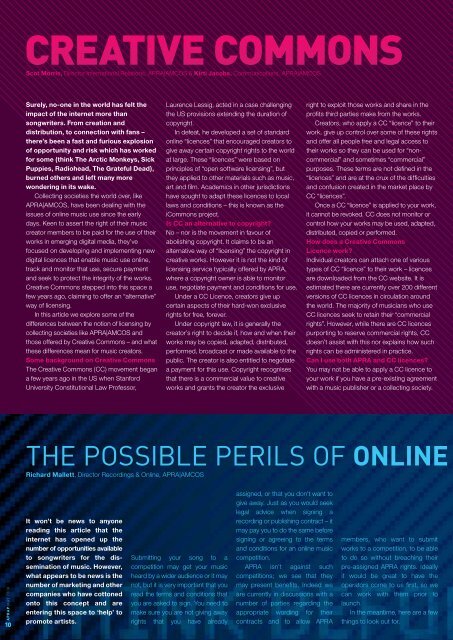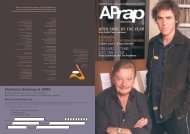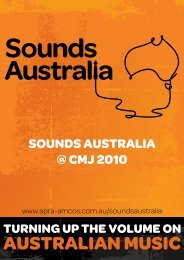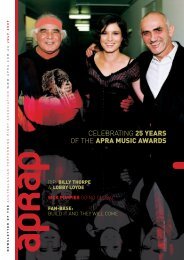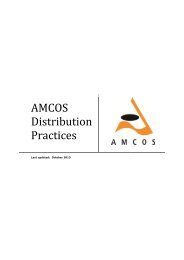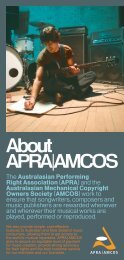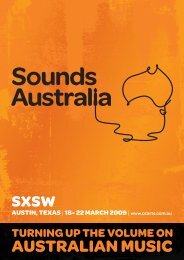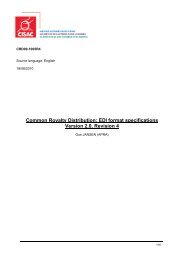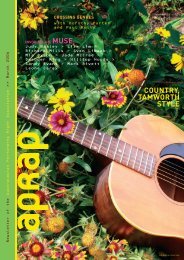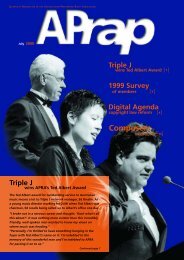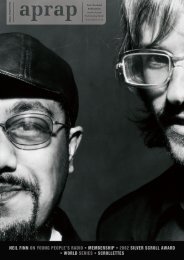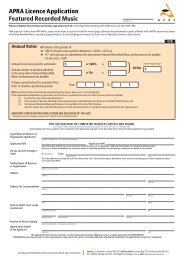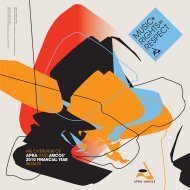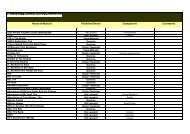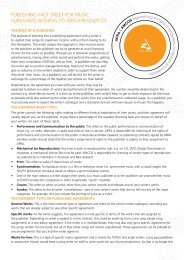online music com - APRA
online music com - APRA
online music com - APRA
Create successful ePaper yourself
Turn your PDF publications into a flip-book with our unique Google optimized e-Paper software.
CREATIVE COMMONS<br />
Scot Morris, Director International Relations, <strong>APRA</strong>|AMCOS & Kirti Jacobs, Communications, <strong>APRA</strong>|AMCOS<br />
Surely, no-one in the world has felt the<br />
impact of the internet more than<br />
songwriters. From creation and<br />
distribution, to connection with fans –<br />
there’s been a fast and furious explosion<br />
of opportunity and risk which has worked<br />
for some (think The Arctic Monkeys, Sick<br />
Puppies, Radiohead, The Grateful Dead),<br />
burned others and left many more<br />
wondering in its wake.<br />
Collecting societies the world over, like<br />
<strong>APRA</strong>|AMCOS, have been dealing with the<br />
issues of <strong>online</strong> <strong>music</strong> use since the early<br />
days. Keen to assert the right of their <strong>music</strong><br />
creator members to be paid for the use of their<br />
works in emerging digital media, they’ve<br />
focused on developing and implementing new<br />
digital licences that enable <strong>music</strong> use <strong>online</strong>,<br />
track and monitor that use, secure payment<br />
and seek to protect the integrity of the works.<br />
Creative Commons stepped into this space a<br />
few years ago, claiming to offer an “alternative”<br />
way of licensing.<br />
In this article we explore some of the<br />
differences between the notion of licensing by<br />
collecting societies like <strong>APRA</strong>|AMCOS and<br />
those offered by Creative Commons – and what<br />
these differences mean for <strong>music</strong> creators.<br />
Some background on Creative Commons<br />
The Creative Commons (CC) movement began<br />
a few years ago in the US when Stanford<br />
University Constitutional Law Professor,<br />
Laurence Lessig, acted in a case challenging<br />
the US provisions extending the duration of<br />
copyright.<br />
In defeat, he developed a set of standard<br />
<strong>online</strong> “licences” that encouraged creators to<br />
give away certain copyright rights to the world<br />
at large. These “licences” were based on<br />
principles of “open software licensing”, but<br />
they applied to other materials such as <strong>music</strong>,<br />
art and film. Academics in other jurisdictions<br />
have sought to adapt these licences to local<br />
laws and conditions – this is known as the<br />
iCommons project.<br />
Is CC an alternative to copyright?<br />
No – nor is the movement in favour of<br />
abolishing copyright. It claims to be an<br />
alternative way of “licensing” the copyright in<br />
creative works. However it is not the kind of<br />
licensing service typically offered by <strong>APRA</strong>,<br />
where a copyright owner is able to monitor<br />
use, negotiate payment and conditions for use.<br />
Under a CC Licence, creators give up<br />
certain aspects of their hard-won exclusive<br />
rights for free, forever.<br />
Under copyright law, it is generally the<br />
creator’s right to decide if, how and when their<br />
works may be copied, adapted, distributed,<br />
performed, broadcast or made available to the<br />
public. The creator is also entitled to negotiate<br />
a payment for this use. Copyright recognises<br />
that there is a <strong>com</strong>mercial value to creative<br />
works and grants the creator the exclusive<br />
right to exploit those works and share in the<br />
profits third parties make from the works.<br />
Creators, who apply a CC “licence” to their<br />
work, give up control over some of these rights<br />
and offer all people free and legal access to<br />
their works so they can be used for “non<strong>com</strong>mercial”<br />
and sometimes “<strong>com</strong>mercial”<br />
purposes. These terms are not defined in the<br />
“licences” and are at the crux of the difficulties<br />
and confusion created in the market place by<br />
CC “licences”.<br />
Once a CC “licence” is applied to your work,<br />
it cannot be revoked. CC does not monitor or<br />
control how your works may be used, adapted,<br />
distributed, copied or performed.<br />
How does a Creative Commons<br />
Licence work?<br />
Individual creators can attach one of various<br />
types of CC “licence” to their work – licences<br />
are downloaded from the CC website. It is<br />
estimated there are currently over 200 different<br />
versions of CC licences in circulation around<br />
the world. The majority of <strong>music</strong>ians who use<br />
CC licences seek to retain their “<strong>com</strong>mercial<br />
rights”. However, while there are CC licences<br />
purporting to reserve <strong>com</strong>mercial rights, CC<br />
doesn’t assist with this nor explains how such<br />
rights can be administered in practice.<br />
Can I use both <strong>APRA</strong> and CC licences?<br />
You may not be able to apply a CC licence to<br />
your work if you have a pre-existing agreement<br />
with a <strong>music</strong> publisher or a collecting society.<br />
THE POSSIBLE PERILS OF ONLINE<br />
Richard Mallett, Director Recordings & Online, <strong>APRA</strong>|AMCOS<br />
APR AP MAY 2008<br />
10<br />
It won’t be news to anyone<br />
reading this article that the<br />
internet has opened up the<br />
number of opportunities available<br />
to songwriters for the dissemination<br />
of <strong>music</strong>. However,<br />
what appears to be news is the<br />
number of marketing and other<br />
<strong>com</strong>panies who have cottoned<br />
onto this concept and are<br />
entering this space to ‘help’ to<br />
promote artists.<br />
Submitting your song to a<br />
<strong>com</strong>petition may get your <strong>music</strong><br />
heard by a wider audience or it may<br />
not, but it is very important that you<br />
read the terms and conditions that<br />
you are asked to sign. You need to<br />
make sure you are not giving away<br />
rights that you have already<br />
assigned, or that you don’t want to<br />
give away. Just as you would seek<br />
legal advice when signing a<br />
recording or publishing contract – it<br />
may pay you to do the same before<br />
signing or agreeing to the terms<br />
and conditions for an <strong>online</strong> <strong>music</strong><br />
<strong>com</strong>petition.<br />
<strong>APRA</strong> isn’t against such<br />
<strong>com</strong>petitions; we see that they<br />
may present benefits. Indeed we<br />
are currently in discussions with a<br />
number of parties regarding the<br />
appropriate wording for their<br />
contracts and to allow <strong>APRA</strong><br />
members, who want to submit<br />
works to a <strong>com</strong>petition, to be able<br />
to do so without breaching their<br />
pre-assigned <strong>APRA</strong> rights. Ideally<br />
it would be great to have the<br />
operators <strong>com</strong>e to us first, so we<br />
can work with them prior to<br />
launch.<br />
In the meantime, here are a few<br />
things to look out for.


